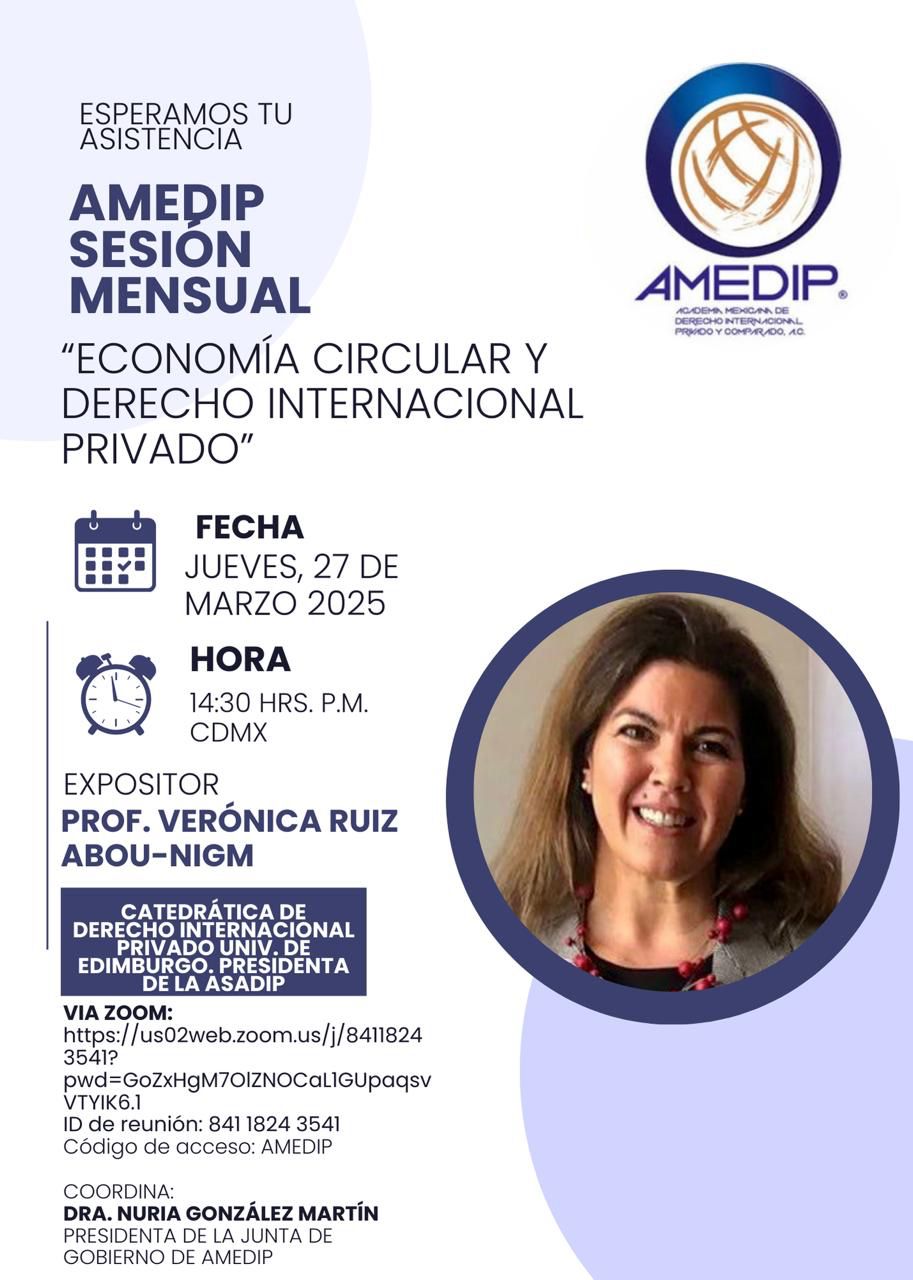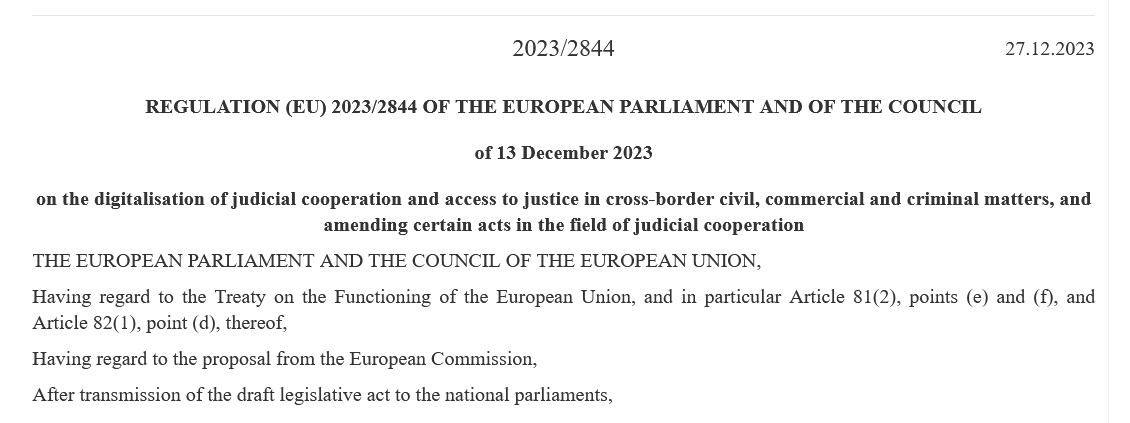Views
New EU Digitalisation Regulation: A Stepping Stone to Digitalised EU?
Author: Martina Ticic, assistant at the University of Rijeka, Faculty of Law and doctoral student funded by the Croatian Science Foundation (Hrvatska zaklada za znanost – HRZZ)
On 13 December 2023, two years after the first legislative proposal has been published, the new Regulation (EU) 2023/2844 of the European
Parliament and of the Council of 13 December 2023 on the digitalisation of judicial cooperation and access to justice in cross-border civil, commercial and criminal matters, and amending certain acts in the field of judicial cooperation (Digitalisation Regulation) has been adopted. While the process of digitalisation of judicial cooperation and cross-border procedures in the EU has been ongoing for some time already, the new Digitalisation Regulation represents a major step for advancing digitalisation practices in the EU.
Bahraini High Court on Choice of Court and Choice of Law Agreements
I. Introduction
It is widely recognized that choice of court and choice of law agreements are powerful tools for structuring and planning international dispute resolution. These agreements play an important role in “increasing legal certainty for the parties in cross-border transactions and reducing incentives for (the harmful version of) forum shopping.” (Alex Mills, Party Autonomy in Private International Law (CUP, 2018) p. 75). However, the realization of these objectives depends on the enforcement of the parties’ choice. Unfortunately, general practice in the MENA (North Africa and the Middle East) region shows that, with a few exceptions, the status quo is far from satisfactory. Choice-of-court agreements conferring jurisdiction on foreign courts are often disregarded or declared null and void. Similarly, the foreign law chosen as the governing law of a contract is often not applied because of the procedural status of foreign law as a matter of fact, the content of which must be ascertained by the party invoking its application. The recent judgment of the High Court of Bahrain (a first instance court in the Bahraini judicial system) in the Case No. 2/13276/2023/02 of 17 January 2024 is nothing but another example of this entrenched practice that can be observed in the vast majority of countries in the region.
U.S. Supreme Court Decides Great Lakes
On February 21, 2024, the U.S. Supreme Court handed down its decision in Great Lakes Insurance SE v. Raiders Retreat Realty Company, LLC.
The question presented was whether, under federal admiralty law, a choice-of-law clause in a maritime contract can be rendered unenforceable if enforcement is contrary to the “strong public policy” of the U.S. state whose law is displaced. In a unanimous opinion authored by Justice Kavanaugh, the Court concluded that the answer to this question was no. It held that choice-of-law provisions in maritime contracts are presumptively enforceable as a matter of federal maritime law. It further held that while there are narrow exceptions to this rule, state public policy is not one of them.
News
Virtual Workshop (in English) on April 1: Carlos Esplugues on “Take Domestic Law and Run? The Application of Foreign (Private? State?) Law in Times of Uncertainty”

On Tuesday, April 1, 2025, the Hamburg Max Planck Institute will host its monthly virtual workshop Current Research in Private International Law at 11:00 a.m. – 12:30 p.m. (CEST). Professor Carlos Esplugues (University of Valencia) will speak, in English, about the topic
“Take Domestic Law and Run? The Application of Foreign (Private? State?) Law in Times of Uncertainty”
The possible application of foreign law is one of the features of contemporary private international law, a discipline that is particularly sensitive to the social, political and economic environment in which it operates. However, the redefinition of the role of the State in modern societies, technological changes or the growing wave of intolerance and fear towards what comes from abroad in many parts of the world are creating a new environment that affects this question in a pluralistic way. Beyond the classical issue of the nature of the applicable law and its relationship to the process, questions are being raised about the viability of this possible applicability and the conditions under which it can be established.
The presentation will be followed by open discussion. All are welcome. More information and sign-up here.
If you want to be invited to these events in the future, please write to veranstaltungen@mpipriv.de.
AMEDIP’s upcoming webinar: Circular Economy and Private International Law (27 March 2025 – In Spanish)

The Mexican Academy of Private International and Comparative Law (AMEDIP) is holding a webinar on Thursday 27 March 2025 at 14:30 (Mexico City time – CST), 21:30 (CET time). The topic of the webinar is ‘Circular Economy and Private International Law’ and will be presented by Prof. Verónica Ruiz Abou-Nigm (in Spanish).
New Canadian Conflicts Text
The Irwin Law “Essentials Series” is a collection of texts about Canadian law aimed at a broad audience: it includes law students and also lawyers, judges and academics. It has been quite successful over the past twenty years. In 2024 Irwin Law was acquired by University of Toronto Press. It has continued the Essentials Series and the use of the Irwin Law imprint.
It has now published the third edition of Conflict of Laws written by Professor Stephen G.A. Pitel of Western University, Canada. The second edition was published in 2016 and so this edition updates almost a decade of activity, mainly from courts across Canada. The major change is that the chapter on declining jurisdiction has been reorganized and updated in light of the Supreme Court of Canada’s decisions in Douez v Facebook, Inc (2017) and Haaretz.com v Goldhar (2018). All chapters have been updated to reflect new decisions, legislative changes and recent scholarship.
More information is available here. For those outside Canada, the book is a clear and accessible source of comparative conflict of laws analysis.



